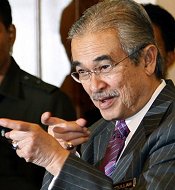-
(单词翻译:双击或拖选)
 |
| Malaysia's Prime Minister Abdullah Ahmad Badawi gestures before press conference in Kuala Lumpur, 08 Oct 2008 |
Malaysian Prime Minister Abdullah Ahmad Badawi announced he was stepping down from his post in March - four years before the end of his term - to save his ruling party from splitting.
Mr. Abdullah, whose announcement was widely expected, said he would nominate his deputy, Najib Razak, as party president of the ruling Barisan Nacional.
The ruling-party president automatically becomes prime minister.
Abdullah has been facing mounting pressure to resign since his United Malays National Organization, called UMNO - which forms the core of the Barisan Nacional coalition2 - lost its majority rule in the March general elections to the opposition3 coalition.
Abdullah said his decision to resign was to keep the party coalition united.
"I will not stand for the presidency4 of UMNO in the coming party election," he said. "I do not want a divided party and governing coalition, but one that is united and harmonious5. A united Barisan Nacional is vital in order for the country to face the global challenges ahead and for Malaysia to become a fully6 developed nation with prosperity and fairness to all."
Opposition leader Anwar Ibrahim has repeatedly said he has enough parliamentary defectors to bring down the government, despite facing sodomy charges he says are politically motivated.
But political analyst7 Khoo Kay Peng says with the country facing economic and political turmoil, both coalitions8 will need to work together no matter who is prime minister.
"You need a national unity9 government because Malaysia at the moment has a very highly centralized federal government. And with the political contestation going on between the two coalitions, you will make it very difficult for it to work ... so I think the point is that we will have to see whether the two of them can come now to their senses and say that for now the focus has to be on the economy," said Khoo Kay Peng.
Analysts10 say Malaysia's economy, already hard hit by the high price of oil - inflation reached a 27-year high this month - will further slow down because of the global financial crisis, with growth expected at just three percent in 2009.
 收听单词发音
收听单词发音
1
turmoil

|
|
| n.骚乱,混乱,动乱 | |
参考例句: |
|
|
|
2
coalition

|
|
| n.结合体,同盟,结合,联合 | |
参考例句: |
|
|
|
3
opposition

|
|
| n.反对,敌对 | |
参考例句: |
|
|
|
4
presidency

|
|
| n.总统(校长,总经理)的职位(任期) | |
参考例句: |
|
|
|
5
harmonious

|
|
| adj.和睦的,调和的,和谐的,协调的 | |
参考例句: |
|
|
|
6
fully

|
|
| adv.完全地,全部地,彻底地;充分地 | |
参考例句: |
|
|
|
7
analyst

|
|
| n.分析家,化验员;心理分析学家 | |
参考例句: |
|
|
|
8
coalitions

|
|
| 结合体,同盟( coalition的名词复数 ); (两党或多党)联合政府 | |
参考例句: |
|
|
|
9
unity

|
|
| n.团结,联合,统一;和睦,协调 | |
参考例句: |
|
|
|
10
analysts

|
|
| 分析家,化验员( analyst的名词复数 ) | |
参考例句: |
|
|
|















